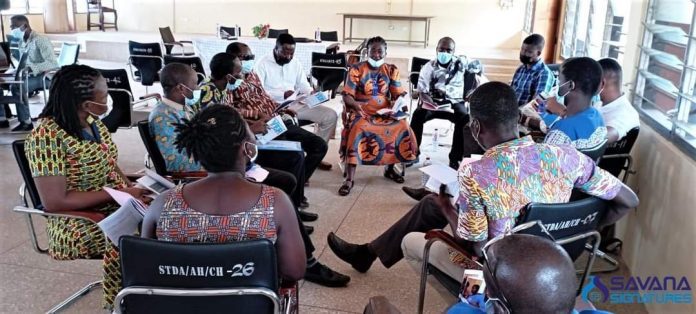Gender-based Violence (GBV) over the years has seen an increasing rate within rural and urban communities in Ghana.
Girls and boys (both in and out of school), women, and men experience GBV at a point in their life but research and reports have shown the majority of victims to be women and girls.
This human rights infringement is a universal problem occurring in every culture and social group, with schools not being an exception.
To support communities and schools inadequately preventing and responding to the incidence of SGBV in the Volta Region, Savana Signatures with support from UNESCO Ghana, through the Youth Empowerment Project (YEP), has engaged headteachers, and regional and district officials of Ghana Education Service, and the Departments of Social Welfare and Community Development, in an orientation exercise focused on SGBV prevention in the South and Central Tongu Districts of the Volta Region of Ghana.
The YEP aims at empowering adolescents and young people in and out of schools with an accurate and age-appropriate integrated model of Reproductive Health Education (RHE) in the two districts.
The engagement, therefore, forms part of several coordinated interventions to galvanize stakeholders’ support in empowering adolescent girls and boys with the requisite knowledge on SGBV to enable them to assert their rights and realize their potential, thereby contributing to the development of their communities and the economy of Ghana.
As part of the engagement, stakeholders were introduced to Savana Signatures’ School and Community GBV Prevention and Response Guideline, a comprehensively well-researched document developed by communities, school leadership, as well as GHS and GES with support from UNESCO Ghana to guide communities to curb the incidences of SGBV.

The guideline will be rolled out in 38 Junior High Schools implementing the YEP in the Central and South Tongu districts in the region.
Speaking at the event, Elikem Agbenyo, the Project Manager for the YEP, stressed the need for the implementation of tangible SGBV guidelines in schools to curtail SGBV abuses in our schools.
He added that the school and community-related GBV Prevention and Response Guideline document is timely and would be a pacesetter for the implementation of similar interventions across all schools in the country.
The guideline document, which he says is a panacea to SGBV issues in schools, covers; acts that constitute SGBV, context, perpetrators, victims, response, legal resolutions, support, sustainability, and more.
He added that the stakeholder engagement provided the platform to engage stakeholders on their respective roles and responsibilities in ensuring that avenues and tools to aid GBV redress are adhered to without compromise.
These compromises, he stressed, create impunity and allow the violations to thrive to the detriment of especially women and girls.
“Our efforts to prevent SGBV become easy when all stakeholders know and understand their roles and responsibilities, and how to apply them accordingly”.
“A school level orientation will be organized for teachers in the various JHS in the 2 districts to ensure all staff of GES understood the guidelines and are supportive of healthy schools where adolescent girls and boys understand their rights, what comprises SGBV and are aware of and know how to use the various reporting mechanisms,” he added with regards to plans beyond this initial engagement.
The South Tongu District Director of Education, Madam Evelyn Zentey remarked that issues of gender-based violence, especially within schools, are not reported leaving the victims to go through life with painful experiences and memories about the abuses.
“These incidences, when not dealt with, affect adolescents’ growth and development and their ability to contribute meaningfully to national development,” she added.
According to her, the school and community-based GBV prevention and response Guidelines will enhance the knowledge base of adolescents within beneficiary schools and empower them to identify, and speak out against any acts that violate their human rights.
“To achieve violence-free schools and communities, District Level Committees will be instituted to work closely with School Management Committees (SMCs), Parent Associations (PAs), DOVVSU, the Departments of Social Welfare and Community Development, Ghana Health Service, CHRAJ, Traditional and Religious Leaders to help address all forms of SGBV,” she said.
This was buttressed by the Regional Guidance and Counselling Coordinator of GES, Gideon Tsawodzi, who stressed the need for school heads, as a matter of urgency, to work closely with SMCs and PAs executives to institute the committees to ensure the purpose of the project is achieved.
Stakeholders were enthused about the initiative as they remarked that, it is unlike the traditional methods of fighting SGBV.
They also praised the initiative for incorporating the UNICEF and Savana Signatures’ AGOO SHE+ Toll-Free Helplines into the intervention, whiles adding that, adolescents can now easily call to seek information or clarification on SGBV issues or even report cases when they feel threatened.
The AGOO SHE+ Toll-Free Helplines are adolescent-oriented, youth-friendly, and engagement platforms that provide information, counseling, and referral services for young people.
The services provided are easy to access, confidential and private.


